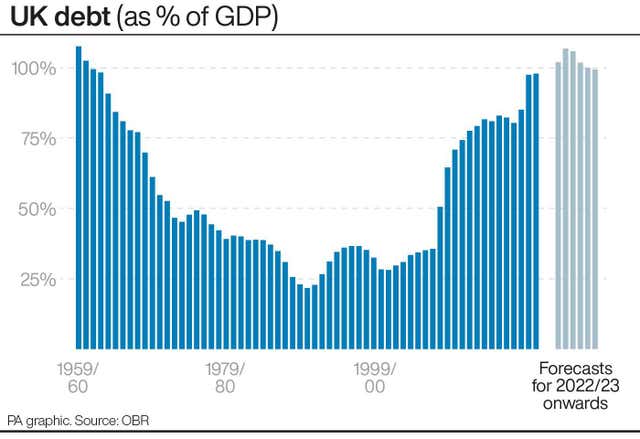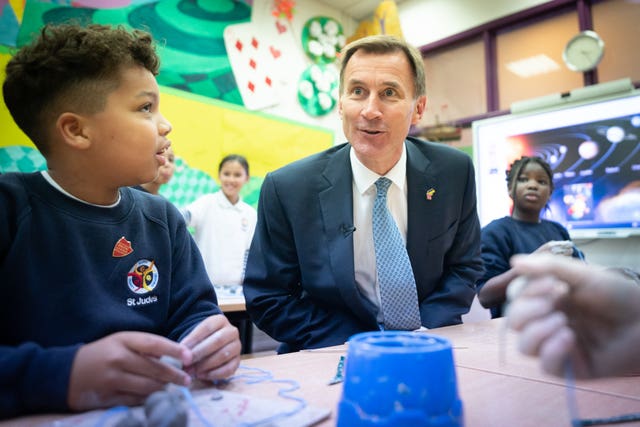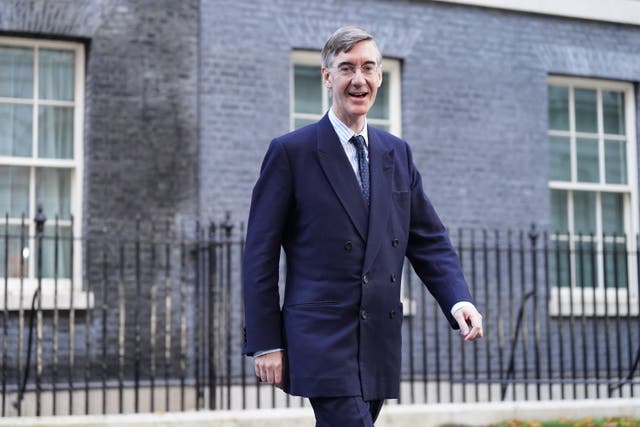
Clare Foges 6pm - 9pm
17 November 2022, 21:14

Here is the reaction to different sections of the autumn statement.
Jeremy Hunt has delivered his autumn statement to MPs in the House of Commons, during which he said he was having to make difficult decisions.
The Chancellor’s package is a move away from his predecessor Kwasi Kwarteng, whose mini-budget less than two months ago led to chaos in the markets.
Here is the reaction to different sections of the autumn statement:
– Business
Michael Kill, chief executive of the Night Time Industries Association, said: “This Government is guilty of neglecting thousands of businesses and millions of employees and freelancers across the night-time economy, this budget has not gone far enough and still lacks clarity, and will without doubt see a huge swathe of SMEs and independent businesses disappear in the coming months.
“When businesses should be preparing for the busiest period of the year, they are now having to consider their future, and will remember the fourth failed attempt to deliver a budget to safeguard businesses at the sharpest end of the crisis.
“There is no consideration for the human impact, this will have a devastating effect on not only business owners but the individuals and families who have committed their lives and livelihoods to this sector.”

CBI chief economist Rain Newton-Smith said: “The test for the autumn statement was to deliver stability at the same time as unveiling a clear plan for growth.
“The Chancellor deserves credit for delivering stability, as well as protecting the most vulnerable, but businesses will think there’s more to be done on growth.
“Backing the CBI’s call for a freeze in business rates and smoothing the increase for those facing higher bills is very welcome.”
She added: “But stabilising public finances inevitably means difficult decisions have to be taken. Businesses will view a freeze in NICs thresholds and further windfall taxes as the sharpest stings in the tail.
“Firms will also need more detail on what happens with the business energy support scheme in the coming weeks.”
We were glad to see the Chancellor @Jeremy_Hunt backing our call to freeze business rates, but firms are likely to want more to be done on growth to help lift us out of the current crisis.
Read our full response to the #AutumnStatement here: https://t.co/NmtKW5hjaW pic.twitter.com/YUGJOUkXzu
— CBI (@CBItweets) November 17, 2022
– Health
The NHS budget in England will increase by an extra £3.3 billion in each of the next two years.
However, implementation of social care reforms will be delayed for two years.
Labour former minister Dame Meg Hillier, who chairs the Public Accounts Committee, said: “The Chancellor has unveiled large numbers, or numbers that seem large. But let’s be clear, take the NHS, that £3.3 billion a year is not even Osborne-esque funding for the NHS.
“It is not enough to keep the NHS standing still. Will he level with us and tell us what percentage of the NHS budget it is?”
– Education
Mr Hunt said an extra £2.3 billion per year will be invested in schools in England over the next two years.
Geoff Barton, general secretary of the Association of School and College Leaders (ASCL), described the increased funding as “positive news for education”.
He added: “However, the devil tends to be in the detail and we’ll be closely looking at the figures to fully understand the implications. In particular, we’ll be looking at where this leaves special educational needs and post-16 provision which are both facing extraordinarily difficult financial circumstances.
“We recognise this commitment to education is made in the context of a bleak economic picture but to put it into perspective this comes after a decade of real-terms cuts to schools and colleges.”

– Energy bills
Economists at the Resolution Foundation warned of a “huge cliff-edge” in support for energy bills, with anyone earning a single pound too much missing out on £900 of help.
Chief executive Torsten Bell said: “In the short term, the Chancellor has announced a smaller but more progressive energy support package, with two-thirds going to the poorest half of households.
“But there will still be plenty of rough justice – particularly for the 2.3 million low-income households who don’t receive means-tested benefits and therefore don’t qualify for lump-sum payments.
“The Chancellor announced concrete and big tax rises, disproportionately hitting middle and higher income households, while significant spending cuts were only pencilled in for after the next election and are unlikely to be delivered on the scale envisaged.”
He added: “Today provided the more reality-based version – but that reality will feel very tough indeed as unemployment and energy bills rise while average incomes fall by £1,700 over this year and next.”
– Cost of living
Nicholas Wilson, 65, has recently been diagnosed with prostate cancer and expects further expenses due to travelling for radiotherapy treatment.
He said Mr Hunt’s £900 cost-of-living payments for those on benefits is “coming too late”.
“It’s a good thing, but 10.1% of very little is still very little,” Mr Wilson told the PA news agency.
“It’s coming too late… we’ve got winter to get through with fuel bills.
“Something needs to be done now, effective straight away… It’s a typical Tory budget – hammers the poor and protects the rich.”

Disabled widower Jason Alcock, 51, who has autism, ADHD and bipolar disorder and uses technology to communicate from his home, has to “completely change” the way he lives to be able to pay his energy costs.
He said: “We’re going to have a really cold winter and people are going to die because they’re not going to turn on their heating.
“I’m living in one room upstairs because the heat rises… That’s the only room I’m heating.
“I’ve heard of friends who, when their children go to bed at seven o’clock at night, they turn off the heating… This shouldn’t be happening for anyone.”
– Taxes
Former Cabinet minister Jacob Rees-Mogg, who quit as business secretary when Rishi Sunak became Prime Minister, said taxation was too high and that ministers should be seeking to cut spending through efficiency savings in public services.

“I think the Conservative Party should ensure that tax in the country and the expenditure match at a reasonable level. Taxation has got too high and there are issues with the level of expenditure that we have got,” he told Channel 4 News.
“I think there is a real problem with fiscal drag bringing more and more people into the 40p (tax) band who, particularly if they are living in the south of England, are not necessarily particularly well off.
“That is going to be hard for them paying an extra level of tax on top of what they are already paying.
“Also, freezing the basic band is going to be a burden for all taxpayers, even those who are still in receipt of benefit.
“I think we need to look at the efficiency of government to make sure money is well spent before reaching for the easy option of putting up taxes.”
– Bankers’ bonuses
Labour shadow chancellor Rachel Reeves questioned the fairness of not abolishing nom-dom status and of lifting the cap on bankers’ bonuses.
She said: “The Chancellor is trying to claim that this statement today is fair yet we learn that of all the things that he could save from the wreckage of the kamikaze budget that he chooses to press ahead with their plan to lift the cap on bankers’ bonus at a time when he’s urging wage restraint for everybody else, how can he remotely claim that this is fair.
“The Chancellor won’t, after all, be clamping down on nom-doms – tax-free income for millionaires, while millions face frozen tax allowances.”
– Entertainment
Responding to the autumn statement, Paul Pacifico, chief executive of the Association of Independent Music (AIM), called for investment in the next generation of creatives.
He said: “AIM welcomes the Government’s proposed tax cut on businesses rates, but with small independent businesses increasingly squeezed by rising costs, UK music stands to suffer unless we create greater incentive for investing in the next generation of creative and entrepreneurial talent.
“While we understand the need to cut costs in today’s budget, we call on the Government to give serious consideration to measures to support the future of the sector in the spring statement.
“For example, extending creative industry tax reliefs to cover British music could play a vital role in encouraging investment and maintaining a healthy music ecosystem.”
Philippa Childs, head of broadcasting and creative industries union Bectu, criticised the autumn statement, saying: “There is very little in this budget to calm the perfect storm facing the UK’s theatre sector. Its workers and businesses were among the hardest hit by the pandemic and continue to face challenges in getting audiences to return.
“They are now battling soaring running and living costs with low wages, unpredictable employment and reduced audience footfall. That’s in addition to the continuing post-Brexit touring restrictions.”